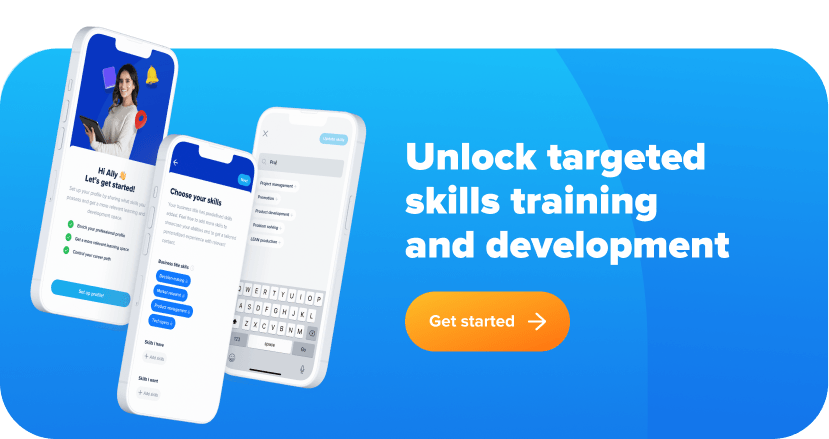Investing in skills development: attract and retain talent
Investing in skills development remains a critical focus for organizations in 2024 as they navigate new emerging economies and dynamic workplace models. By embracing this approach, organizations can better align their HR strategies with their overall business goals, leading to increased productivity and profitability.
Therefore, comprehensive employee training and development opportunities are increasingly recognized as essential for nurturing a culture of continuous learning and growth within organizations (Deloitte, 2023). Besides, studies show that companies that invest in educational programs and provide their employees with a clear career plan are more likely to attract and retain top talent.
With the advent of new technologies and market disruptions, organizations are focusing on leveraging AI tools to identify skill gaps and tailor training initiatives effectively (World Economic Forum, 2023). This ensures that the right skills are developed to meet (future) business needs and streamline the training process.
Moreover, by evaluating employees based on their skills and performance, organizations can better understand their workforce’s capabilities and potential for growth. This proactive approach fosters employee development, bridges skills gaps, and strengthens the organization’s talent pipeline.
The ‘new’ skills
McKinsey & Company emphasize the importance of balancing hard and soft skills in training agendas. They highlight the need for employees to possess both technical expertise and interpersonal abilities to drive organizational success.
Interpersonal skills and effective communication are now as vital as machine learning and cloud computing in the future of work. While AI is advancing to a dominant position, critical thinking and creativity are becoming the leading skills of the years to come.
Tailored paths are specifically designed to address each employee’s unique needs and aspirations, ensuring that they receive targeted support to thrive in their professional journey. Personalized learning pathways provide customized approaches for employees to enhance their job-specific technical skills or soft skills like communication and leadership based on their goals and learning preferences.

Cultivating motivated and agile workforces
Investing in skill development programs that address these evolving needs is crucial for organizations aiming to build resilient and agile workforces (PwC, 2023). Therefore, offering skills mapping and personalized learning pathways to employees is a strategic initiative that can significantly benefit both individuals and the organization.
By providing training that encompasses technical and interpersonal skills, companies can cultivate a well-rounded workforce ready to tackle whatever comes their way. Investing in skills development, whether through in-house training programs, microlearning, external courses, or mentorship opportunities, is a win-win for both employees and employers. Additionally, it encourages productivity, and innovation and fosters a supportive work environment where everyone can thrive.
In other words, a structured skills-learning strategy ensures that employees have the skills needed to excel in their roles and prepares them to adapt to future challenges and opportunities. A work culture that prioritizes continuous development will inspire and motivate your teams and ultimately lay the foundation for your business’ sustainable growth and success.
Remember, investing in your employees is investing in your company’s future.







